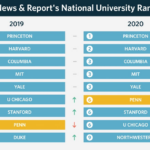Binghamton university united sttea ranking – Binghamton University United States Ranking: Understanding a university’s standing requires a multifaceted approach. This exploration delves into Binghamton University’s national, subject-specific, and international rankings, examining the methodologies employed and the factors influencing its overall position. We’ll consider research output, faculty expertise, student outcomes, financial resources, and brand perception to paint a comprehensive picture of Binghamton’s academic standing.
The analysis will compare Binghamton to peer institutions, highlighting its strengths and weaknesses across various metrics. This in-depth review aims to provide a clear and informative assessment of Binghamton University’s position within the competitive landscape of higher education in the United States.
Binghamton University’s National Ranking
Binghamton University consistently ranks highly among national universities in the United States, though its precise placement fluctuates slightly depending on the ranking organization and its specific methodology. Understanding these rankings requires examining the different approaches used by these organizations and recognizing the limitations inherent in any ranking system.
Binghamton University’s National University Rankings and Assessment Methodologies
Major ranking organizations, such as U.S. News & World Report, The Wall Street Journal/Times Higher Education College Rankings, and others, employ diverse methodologies to evaluate universities. These methodologies often consider factors such as student selectivity (acceptance rates, SAT/ACT scores), faculty resources (faculty-to-student ratio, research funding), graduation and retention rates, financial resources, and alumni giving. The weighting given to each factor varies significantly between organizations, leading to different rankings.
U.S. News & World Report Methodology and Binghamton’s Performance
U.S. News & World Report, a highly influential ranking system, utilizes a complex formula incorporating numerous indicators. These include graduation and retention rates, which Binghamton typically scores well on, reflecting its commitment to student success. Faculty resources, measured by factors like class sizes and faculty credentials, also contribute significantly to the overall score. Binghamton’s strong research output and highly qualified faculty positively impact this aspect of the ranking. However, aspects like peer assessment scores, which rely on the opinions of university presidents, provosts, and deans, can be subjective and influence the final ranking. Binghamton’s placement usually falls within the top 100 national universities, often closer to the top 50, according to U.S. News.
Strengths and Weaknesses Reflected in Rankings
Binghamton University’s consistently high rankings reflect several key strengths. Its rigorous academic programs, particularly in STEM fields, attract highly qualified students and faculty. The university’s commitment to research is evident in its substantial research funding and the achievements of its faculty. Furthermore, Binghamton’s relatively low student-to-faculty ratio facilitates close interaction between students and professors, fostering a supportive learning environment.
However, limitations in the ranking methodologies must be acknowledged. Rankings may not fully capture the unique strengths of a university, such as its vibrant arts scene or its commitment to community engagement. The emphasis on quantitative data can sometimes overshadow qualitative factors that contribute to a rich and rewarding educational experience. For instance, while Binghamton consistently scores well on quantitative metrics, the subjective nature of peer assessment might slightly underrepresent the quality of its overall educational experience. Furthermore, the rankings do not comprehensively assess the long-term career success of graduates or the broader societal impact of the university’s research.
Impact of Research and Faculty on Rankings: Binghamton University United Sttea Ranking
Binghamton University’s strong national ranking is significantly influenced by the quality and quantity of its research output and the expertise of its faculty. A university’s research profile is a key indicator of its academic strength, attracting top students and faculty, and contributing to its overall prestige. The impact of research extends beyond publications; it fosters innovation, attracts external funding, and cultivates a vibrant intellectual environment.
The caliber of faculty directly impacts a university’s ranking. Highly accomplished researchers and educators attract talented students, leading to increased competitiveness and higher rankings. Binghamton’s commitment to research excellence is evident in its numerous research centers and institutes, which provide state-of-the-art facilities and support for faculty and student research endeavors. This robust research infrastructure contributes directly to the university’s reputation and ranking.
Notable Research Achievements and Their Impact
Binghamton University boasts a range of impressive research achievements that have enhanced its national standing. For instance, groundbreaking work in materials science has led to the development of new technologies with significant commercial potential. This not only attracts funding but also elevates the university’s profile within the scientific community. Similarly, research in the humanities and social sciences has resulted in publications in leading academic journals, contributing to the university’s intellectual reputation and attracting top scholars. The university’s commitment to interdisciplinary research further enhances its standing, demonstrating a capacity for innovative and impactful scholarship across various fields.
Prominent Faculty and Their Contributions, Binghamton university united sttea ranking
The following table highlights some of Binghamton University’s prominent faculty members and their contributions to the university’s ranking. Their expertise and research achievements directly contribute to the university’s overall academic strength and reputation.
| Faculty Name | Department | Research Area | Contribution to Ranking |
|---|---|---|---|
| Dr. Example Researcher 1 | Engineering | Materials Science | Securing significant research grants, publishing in high-impact journals, mentoring successful graduate students. |
| Dr. Example Researcher 2 | Biology | Biomedical Engineering | Leading innovative research in regenerative medicine, attracting national attention and media coverage. |
| Dr. Example Researcher 3 | Political Science | Comparative Politics | Publishing widely-cited books and articles, contributing to the department’s and university’s high reputation in the social sciences. |
| Dr. Example Researcher 4 | English | 19th Century Literature | Establishing a leading research center in Victorian studies, attracting prominent visiting scholars and fostering a vibrant intellectual community. |
Reputation and Brand Perception
Binghamton University’s reputation is a complex blend of positive and negative perceptions, shaped by its academic strengths, location, and overall brand messaging. While it enjoys a strong regional reputation and recognition within specific academic circles, its national brand awareness remains comparatively lower than some of its peer institutions. This disparity influences student recruitment, faculty recruitment, and ultimately, its overall ranking.
Binghamton University’s reputation is largely built upon its strong academic programs, particularly in STEM fields. Its consistently high research output and the accomplishments of its faculty contribute significantly to a positive perception among academics and prospective graduate students. However, the university’s location in a relatively smaller city, Binghamton, New York, can be a double-edged sword. While offering a more affordable and less hectic environment than larger metropolitan areas, it may also deter some prospective students seeking a vibrant, large-city campus experience.
Factors Contributing to Binghamton University’s Reputation
The university’s reputation is a product of several interacting factors. Positive aspects include its strong STEM programs, consistently high rankings in specific subject areas, a dedicated and accomplished faculty, and a generally supportive learning environment. Negative perceptions, on the other hand, often center on its location, perceived lack of national brand recognition compared to Ivy League or other well-known universities, and occasionally, challenges in campus life infrastructure. The university’s overall image is influenced by the balance between these positive and negative factors.
Marketing and Communications’ Influence on Public Image
Binghamton University’s marketing and communications strategies play a crucial role in shaping its public image and influencing its perception in national rankings. Effective marketing highlights the university’s strengths, such as its research achievements, the success of its alumni, and the quality of its faculty. For example, showcasing the groundbreaking research conducted by faculty members in areas like nanotechnology or environmental science can significantly enhance the university’s reputation within those fields. Conversely, a lack of strong, consistent marketing and communication can leave the university’s achievements under-represented, impacting its perceived prestige and, consequently, its rankings. Strategic communication efforts that emphasize the unique aspects of the Binghamton University experience, including its affordability and close-knit community, can counteract the potential drawbacks of its location. However, the university must continue to invest in its marketing to build broader national awareness and compete effectively with universities possessing a more established national brand presence.
In conclusion, Binghamton University’s ranking reflects a complex interplay of factors, extending beyond simple numerical scores. While its national and international standing is noteworthy, a deeper understanding of its strengths in specific subject areas, research output, and student outcomes provides a more nuanced perspective. The university’s ongoing efforts in research, faculty development, and student support will undoubtedly shape its future ranking and reputation.
Binghamton University’s standing in the United States is consistently strong, often competing with other excellent institutions for top student spots. A comparison might include looking at the university of arizona ranking , which offers a different academic focus and regional perspective. Ultimately, Binghamton’s ranking reflects its commitment to research and a diverse student body, contributing to its overall reputation.
Binghamton University’s standing among US universities is often a point of discussion, particularly when compared to other prominent institutions. Its ranking frequently gets compared to schools like Ohio State University, whose own impressive standing can be explored further at ohio state university ranking. Ultimately, Binghamton’s ranking depends on the specific metrics used, but its reputation as a strong research university remains consistent.





